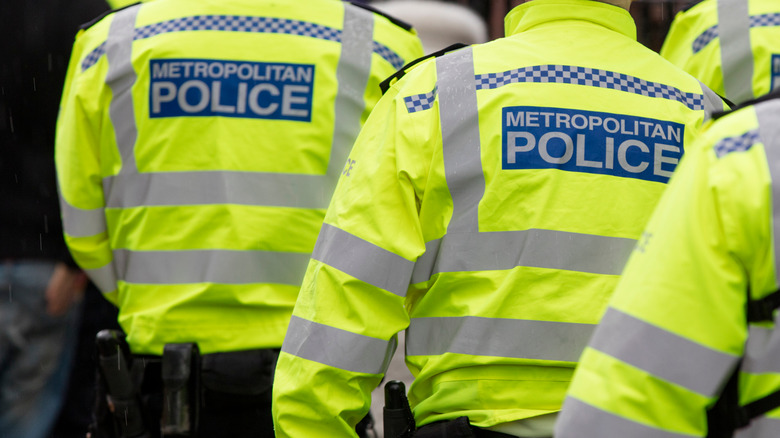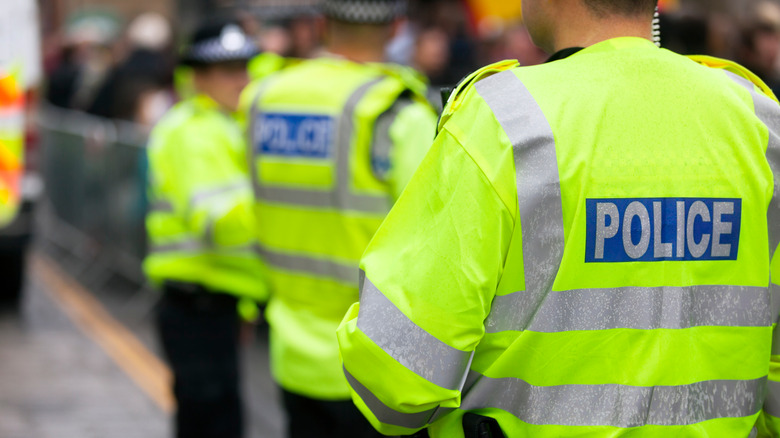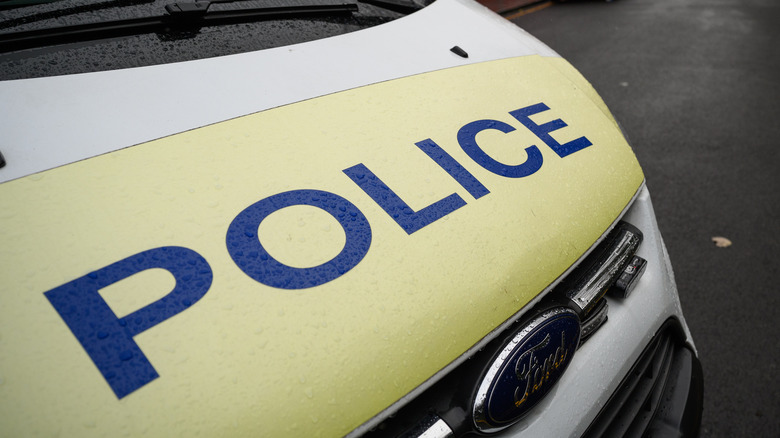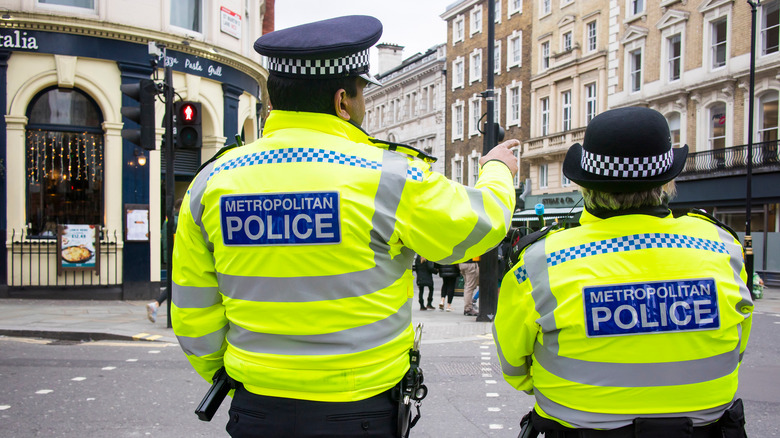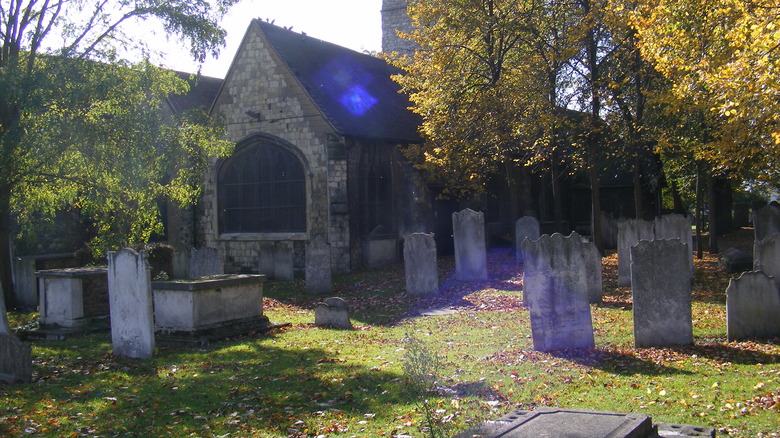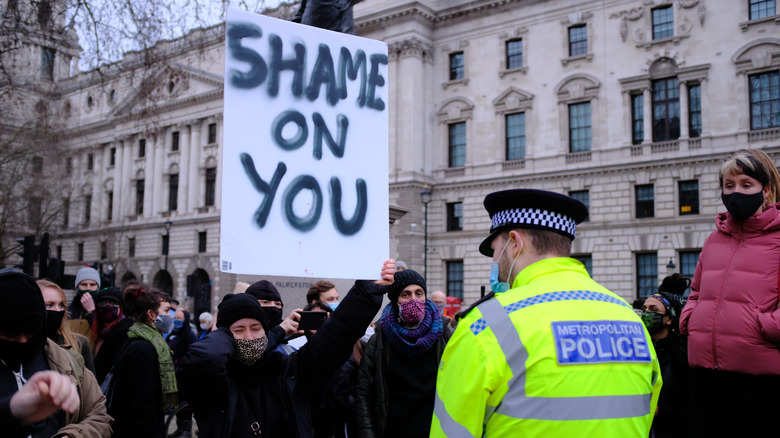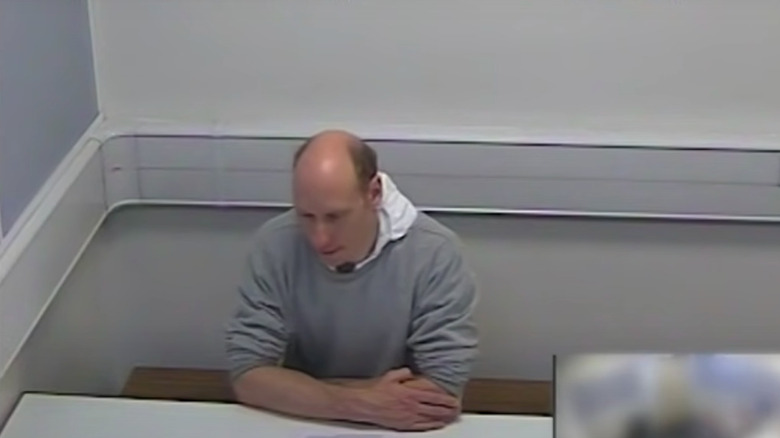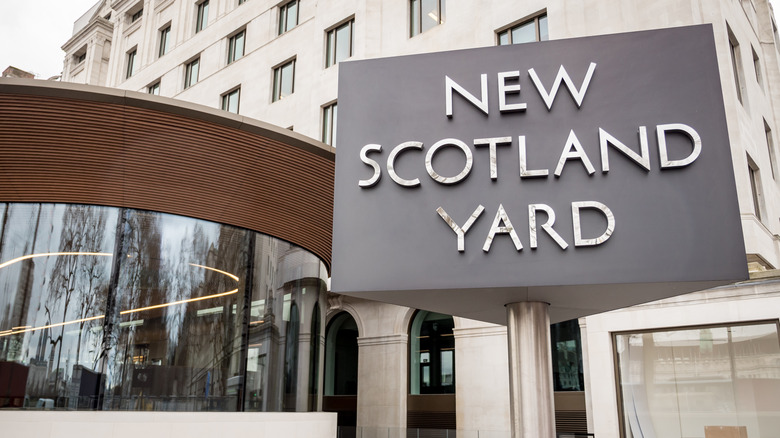The Untold Truth Of The Grindr Killer
During the making of "Four Lives," a 2022 BBC dramatization of the story of the Grindr Killer, producers initially thought the story of lack of police investigation was simply related to "rampant homophobia." But the true story turned out to also include "ineptitude, poor systems, [and] underfunding."
Some, like LGBT rights campaigner Peter Tatchell, have said that the lack of investigation into the murders stemmed from "class, gender, and sexuality bias." Even if the deaths were ultimately the result of "chemsex parties gone wrong," Tatchell asserts that the complete lack of police investigation signals "at the very least, incompetence or homophobia."
Ultimately, although it's much more difficult to effectively prove someone's personal motives, one thing is clear: if the Metropolitan Police in London had investigated the first, second, or even the third murder, serial killer Stephen Port wouldn't have ended up murdering four people and assaulting several others. Why the police didn't investigate is another question, but there's no debate about the fact that three young men were found dead in the same area and police decided that it wasn't suspicious. This is the untold truth of the Grindr Killer.
The early life of Stephen Port
Stephen John Port was born on February 22, 1975, in Southend-on-Sea, Essex. According to the BBC, when he was one year old, his family moved from Essex to Dagenham in east London. There, Port's father worked as a cleaner for the local council while his mother was employed as a supermarket cashier.
When Port was 16 years old, he went to art college but after the tuition for the art college came to be too expensive for his family, he switched to culinary school instead and trained for two years as a chef. Afterwards, Port started working at a bus depot in West Ham as a cook for drivers and staff, writes Distractify.
In 2006, Port moved out of his parents' house and got an apartment of his own in Barking. Making money as a sex worker, Port would also advertise his partners out for sex work, "with Port's phone number as the contact." It's unclear whether or not this was done with or without Port's partners' consent, and at least one photo on an escort website showed the man "either asleep or unconscious on a bed." The Guardian reports that during his trial, Port testified about his own personal safety rules while working as a sex worker: "I would never accept a drink or anything to eat off a client. And I always took my own lube, condoms, and poppers."
Finding people on Grindr
Stephen Port used a variety of dating apps for gay and bisexual men to connect with people, including FitLads, Grindr, Gaydar, and Hornet. The Guardian also reports that Port sometimes used a fake picture, a fake name, and gave fake information. "In one profile, he claimed to be an Oxford graduate. In another, a special needs teacher." At one point, Port wrote on an app that he was "romantic, caring, and would take good care of my partner." But Distractify notes that among his friends, Port was known for cheating on his partners.
In 2012, Port met up with a teenager through Grindr, who noted that Port was initially "quite polite, friendly," the BBC reports. The two went back to Port's apartment and had wine that "tasted bitter, which I attributed to it being cheap." The young man soon felt "very dizzy and tired" and Port told him he could lie down in the bedroom. Going into the room alone, the young man fell asleep immediately and at some point woke up while Port was raping him. He soon fell unconscious again and was "disoriented" in the morning. Port reportedly drove the teenager back to Barking Station in the morning "as if nothing had happened."
Port was seemingly quite active on the dating apps. In Gay Star News, Benjamin G. Wilson writes about messaging with Port on Grindr before Port was arrested, as well as discovering that a friend of his had also messaged with Port briefly.
A brush with the police
The first time Stephen Port encountered the police was roughly three weeks before his first murder. The Guardian reports that in June 2014, Port was seen by several people walking with a young Muslim man in his 20s to the Barking train station. The young man, roughly half the age of Port, "was shouting incoherently, vomiting, and could barely walk."
The BBC reports that the young man had spent time with Port on four previous occasions, but during the fifth visit, Port gave the man poppers and a glass of clear liquid that almost led the young man to completely lose consciousness. The man said, "The next thing I remember I was on the floor screaming and shouting. It was like I was going mad." Noticing that his underwear had been taken off, the young man screamed that he wanted to go home and would continue screaming all the way to Barking Station.
After the young man collapsed at the train station, British Transport Police and an ambulance were called. Both Port and the young man were interviewed by the police but the young man was reportedly worried about his parents learning about his sexuality so he didn't file a charge against Port. And although police noted that Port was "worried and jittery" at the scene, he claimed that he found the young man like that and was simply bringing him to the station to make sure he got home safely. With no allegations made, Port was free to go.
The murder of Anthony Walgate
Anthony Walgate was a 23-year-old fashion student studying at the University of Middlesex when he was contacted by Stephen Port in June 2014. Walgate also occasionally worked as a sex worker and when Port reached out offering "£800 ($1,080) for a single overnight job," the RadioTimes reports, Walgate accepted.
At 4:18 in the morning on June 19, 2014, an ambulance was called to Cooke Street in Barking for a "young boy, looks like he's collapsed outside ... had a seizure or something, or just drunk." When Metropolitan Police and paramedics arrived, Walgate was already dead. Next to him, was his black holdall bag, and police noticed that although there wasn't any sign of injury, Walgate's phone was missing and his body looked as though it had been dragged, BBC reports.
Police questioned Port, who was the one who called the ambulance, but in his witness statement, he claimed that he'd found Walgate lying on the ground outside his door. Port claimed that after attempting to rouse Walgate, he'd propped him up, called the ambulance, and gone to bed. But it wasn't long before police discovered that Port was lying to them. Walgate had followed his own safety rules when it came to sex work and before meeting up with Port, he'd told his friends "about a job in Barking and shown them a picture of the man he was going to meet."
'Perverting the course of justice'
Stephen Port was arrested on June 26, 2014 "on suspicion of perverting the course of justice" and interviewed over two days. And although he stuck to his original story at first, eventually Port admitted that he'd hired Anthony Walgate as a sex worker. The BBC writes that Port also reportedly asked the detectives, "Can I just say for the scenario – if it was an accident, and if he did have a fit in my place, is that still my fault?"
In his revised story, Port claimed that Walgate arrived at Port's apartment, took drugs that he brought himself, and suddenly got tired after having sex and fell asleep in his clothes. Port then claimed that the following day he went to work and found Walgate still sleeping upon his return. Port reportedly also got into bed, but "panicked after waking about 3:00 [AM] to find Walgate rigid" and carried Walgate outside, where police and the ambulance would later find him. Meanwhile, blood and urine samples showed a fatal level of GHB in Walgate's system.
When asked why he moved Walgate, Port claimed that he'd panicked because "if he's dead, they're gonna think that I murdered him," per The Guardian. Released on bail, on March 23, 2015, Port pled guilty to the charge of "perverting the course of justice" due to the false police statement he first made after Walgate's death, and he was sentenced to eight months imprisonment. But by this point, two other young men were already dead.
The murder of Gabriel Kovari
The 22-year-old Gabriel Kovari, also known as Gabriel Kline, was from Slovakia and had moved to London from Spain in 2014. In London, he'd struggled to find a stable place to live and after staying with John Pape for several weeks, Kovari reportedly moved in with Port. On the day he moved, he sent a friend a Google map pin of his new home, "Cooke Street, Barking," writes the BBC.
On August 24, 2014, Stephen Port had invited his friend and neighbor Ryan Edwards to come over and meet his "new Slovakian twink flatmate." Edwards and Kovari ended up meeting briefly that night, and the following day Edwards received a text from Kovari that said "Stephen is not a nice person." The next day, after Edwards asked Port how Kovari was during a text message conversation, Port claimed that Kovari had "gone to stay with another local guy ... some soldier guy he had been chatting to online."
On the morning of August 28, 2014, the dead body of 22-year-old Gabriel Kovari, also known as Gabriel Kline, was discovered by Barbara Denham, who was walking her dog in the graveyard at St Margaret's Church in Barking. According to RadioTimes, although the cause of death was found to be another fatal overdose of GHB, the police didn't connect Kovari's death with Walgate's death. Kovari's friend Pape later accused the Met Police of "institutionalized homophobia" after he was ignored while trying to provide information that might link the deaths.
The murder of Daniel Whitworth
At the time of his death, 21-year-old Daniel Whitworth was building a career as a chef and living in Kent with his boyfriend Ricky Waumsley. According to the BBC, Whitworth and Port first started exchanging messages on the Fitlads website in August 2014, and Whitworth was last seen on September 18, when he told a colleague that he was meeting a friend in Barking.
On the morning of September 20, 2014, Barbara Denham was once again walking her dog when she found the dead body of Daniel Whitworth in the same spot where she discovered Gabriel Kovari just three weeks earlier. "Oh please, let that be somebody asleep—it cannot be the same thing again, in exactly the same place," Denham recounted during the trial, per "Something For The Weekend" by James Wharton. With the body, which was sitting on a blue bedsheet, police also discovered a "suicide note," in which Whitworth confessed to accidentally killing Kovari and said that he was committing suicide because he couldn't live with the guilt. The letter also said, "BTW please do not blame the guy I was with last night."
After the autopsy showed an overdose of GHB and sleeping pills, the Barking and Dagenham Police "deemed the death non-suspicious." Although DCI Tony Kirk did admit that the deaths were "unusual and slightly confusing," detectives didn't even bother trying to investigate what happened to Whitworth before his death or trying to find the mentioned "guy I was with last night."
Obviously a serial killer
Stephen Port was released in June 2015 with an electronic tag, serving just a little over two months of his eight-month sentence. And about three months later, he contacted Jack Taylor on Grindr around 2 AM on September 13, 2015. The BBC reports that 25-year-old Taylor, a forklift truck driver from Dagenham, had spent the night drinking at a local social club before deciding to meet up with Port at Barking Station around 3 AM.
Taylor was found dead less than 36 hours later in St. Margaret's graveyard, according to The Guardian. But despite the fact that Taylor was also found to have died from an overdose of GHB and alcohol, was found in the same graveyard as three other bodies, and also appeared to have been dragged, police determined that the death was a "self-inflicted overdose."
The RadioTimes also reports that the inspector who led the investigation into Taylor's death stated that "neither of the two detectives who attended the crime scene with him had informed him of the similarities between Jack's death and those of three other young men in the area."
The family decides to investigate
Jack Taylor's family refused to believe that his death had been an overdose. According to RadioTimes, Jack's family maintained that he was "an aspiring police officer and firmly anti-drugs" but although police refused to investigate further, Jack's sisters Donna and Jenny continued to do their own research and put together their own investigation.
Police told the Taylor sisters that Jack was seen on CCTV going into the park alone and that he was found with "a needle mark on his right arm, an unused syringe, and a tourniquet, along with a small plastic vial of clear liquid," writes The Guardian. The Taylor sisters "challenged each police assumption," such as the unused syringe tied to an overdose or the needle mark that could've come from donating blood. And after learning about GHB on the internet, they started connecting Jack's death to the three other deaths in Barking, also linked to GHB.
The CCTV footage of Stephen Port and Jack Taylor meeting at Barking Station and walking together would've never been discovered without the persistence of the Taylor sisters, explains "Something For The Weekend." They also connected Jack's death to the three previous deaths, questioning the fact that "None of them were from around here. So why have they been found in this area? What did they come down here for?"
Police incompetence and apathy
Stephen Port was arrested in October 2015, but the Met Police's incompetence and apathy throughout the various investigations leading up to his arrest is staggering. The RadioTimes writes that after the murder of Gabriel Kovari, the Met Police failed to investigate the message Kovari sent to his friend "explaining that he was living at Port's address." And when Daniel Whitworth's body was found, not only did police fail to investigate the most obvious leads, but they also failed to test the DNA on Whitworth's body, clothes, the sleeve the note was found in, or the blue bedsheet Whitworth was found on, BBC reports.
Coroner Nadia Persaud would later testify that it had been "strongly recommended" to the police that they forensically analyze the bedsheet and find the man mentioned in the note. If the police had followed up on the various leads, they would've been led straight to Port. And if they had tested the DNA found on Whitworth, they would've found that the DNA was a match for Port, whose DNA the police already had in their database.
Gabriel Kovari's friend John Pape had also tried to raise concerns and contacted PinkNews, but they decided not to publish a story about it at the time "after police insisted the deaths were not suspicious." And according to The Guardian, the deaths were recorded as unexplained instead of suspicious simply because it cost less. "A suspicious death costs more, as it involves searching laptops and forensic tests."
Re-examining dozens of deaths
After Stephen Port was arrested, eight additional men came forward with allegations against Port and seven testified against him during the trial. According to Digital Spy, Port was convicted on November 23, 2016 for the rape and murder of four people, "three further rapes, four sexual assaults, and 10 counts of administering a substance with intent."
Port was sentenced to a whole life order, which is a life sentence without parole. And after Port was convicted, the Independent reports that the Met Police were reassessing "58 [additional] unexplained deaths involving date-rape drugs." Although a spokesperson for the Met Police stated that there's "nothing to suggest Port is linked to any of them," it's revealing that the police were previously more than willing to let these deaths remain unexplained.
Port started serving his imprisonment at HMP Belmarsh, but his location as of 2022 is unclear. Ultimately, as Gabriel Kovari's friend John Pape told A&E True Crime, Port "should have never made it to four."
An inquest into the police
After Stephen Port's arrest in October 2015, the Metropolitan Police referred themselves to the Independent Police Complaints Commission, now known as the Independent Office for Police Conduct (IOPC). According to "Something For The Weekend," seven officers were charged with gross misconduct and 10 officers were charged with misconduct, affecting officers in different ranks "ranging from constable to inspector."
According to The Guardian, in 2019 the IOPC concluded that "none of the 17 police officers investigated for misconduct would face disciplinary action." Since then, seven of those officers have been promoted. However, the IOPC did identify "systemic failings" within the Met Police and stated that "nine officers will be required to improve their standards."
Assistant Commissioner Helen Ball stated that although the findings of the inquest were "devastating," she insisted that the Met Police weren't "institutionally homophobic." She also claimed that the Met has made improvements since Port's arrest, with "more and better-trained investigators across the entire Met [Police]."
